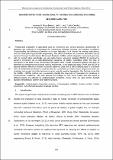Weather effects on human mobility : a study using multi-channel sequence analysis
Abstract
Widespread availability of geospatial data on movement and context presents opportunities for applying new methods to investigate the interactions between humans and weather conditions. Understanding the influence of weather on human behaviour is of interest for diverse applications, such as urban planning and traffic engineering. The effect of weather on movement behaviour can be explored through Context-Aware Movement Analysis (CAMA), which integrates movement geometry with its context. More specifically, we use multi-channel sequence analysis (MCSA) to represent a person’s movement as a multi-dimensional sequence of states, describing either the type of movement or the state of the environment throughout time. Similar movement patterns can then be identified by comparing and aligning mobility sequences. In this paper we apply CAMA and MCSA to explore weather effects on human movement patterns. Data from a GPS tracking study in a Scottish town of Dunfermline are linked to weather data and converted into multi-channel sequences which are clustered into groups of similar behaviours under specific weather typologies. Our findings show that the CAMA + MCSA method can successfully identify the response of commuters to variations in environmental conditions. We also discuss our findings on how travel modes and time spent at different places are affected by meteorological conditions, mainly wind, but also rainfall, daylight duration, temperature, comfort and relative humidity.
Citation
Brum-Bastos , V S , Long , J A & Demsar , U 2018 , ' Weather effects on human mobility : a study using multi-channel sequence analysis ' , Computers, Environment and Urban Systems , vol. In press . https://doi.org/10.1016/j.compenvurbsys.2018.05.004
Publication
Computers, Environment and Urban Systems
Status
Peer reviewed
ISSN
0198-9715Type
Journal article
Description
The authors would like to acknowledge SWB (Science Without Borders) - CAPES (Coordination for the Improvement of Higher Education Personnel) (BEX 13438/13-1) for the financial support during the development of this study.Collections
Items in the St Andrews Research Repository are protected by copyright, with all rights reserved, unless otherwise indicated.

